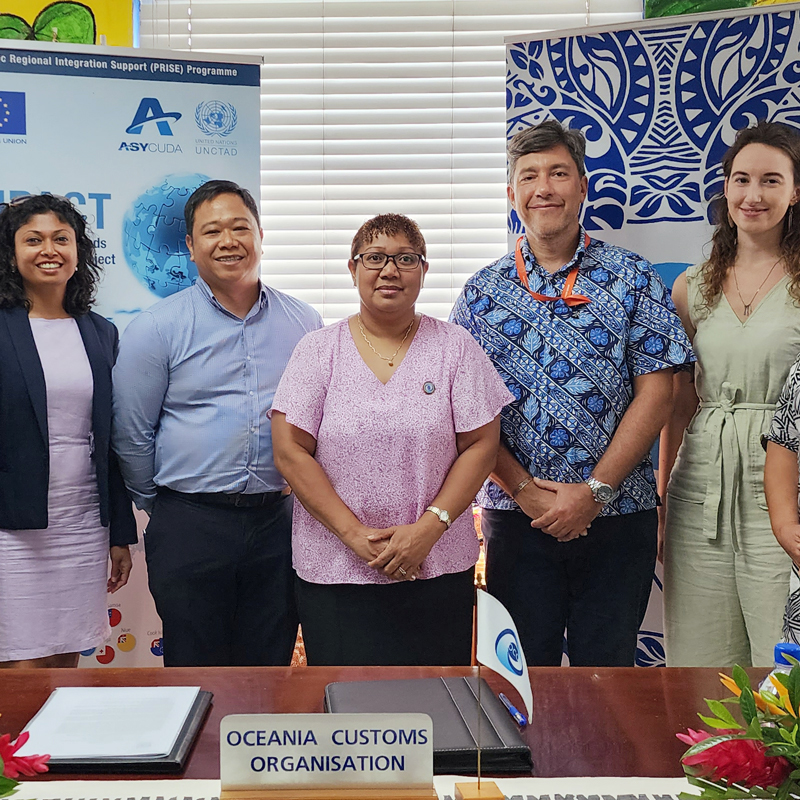
News
Agreement Will Standardize Customs Procedures for 15 Pacific Nations

UNCTAD and the Oceania Customs Organisation (OCO) have signed an agreement under the EU funded ‘Improving Pacific Islands Customs and Trade’ (IMPACT) project that aims to improve customs processes and boost trade in 15 Pacific nations.Through the agreement, UNCTAD will provide funds to the OCO that will enable them to improve and harmonise customs operations in the Cook Islands, Federated States of Micronesia, Fiji, Kiribati, Marshall Islands, Nauru, Niue, Palau, Papua New Guinea, Samoa, Solomon Islands, Timor-Leste, Tonga, Tuvalu, and Vanuatu.
Supported by UNCTAD’s ASYCUDA Programme, the OCO will assist these countries with reviewing and drafting legislation as well as updating customs processes to meet regional and international standards. The OCO will also develop a pool of experts and trainers to ensure the successful implementation of an internationally aligned, regionally focused customs framework.
OCO Head of Secretariat, Ms. Nancy Oraka, said, “Improving and strengthening trade facilitation and border management is critical to be on par with the rest of the world.” She added, “We want to build and strengthen a customs framework and system that can stand the test of time through a strong legislative framework, a modernized digital system but at the same time make sure that it is simple and easy for both customs and the public to utilise.”
Regional Coordinator for UNCTAD’s ASYCUDA Programme in the Pacific, Mr Jayvee Santos, acknowledged that the “partnership with OCO [and member state governments] will ensure the sustainability of trade reform initiatives beyond the project life through the respective secretariats’ mandate to support their members.”
In September 2021, UNCTAD’s ASYCUDA Programme and the EU launched the IMPACT project as part of the EU’s Pacific Regional Integration Support (PRISE) programme. The IMPACT project aims to increase the quality and the volume of goods traded intra-regionally between the above mentioned 15 Pacific Island countries as well as internationally. It aims to achieve this in part by optimizing the border and customs procedures of Pacific Island countries, thereby boosting the region’s economies by facilitating regional and international trade.
UNCTAD and the Oceania Customs Organisation (OCO) have signed an agreement under the EU funded ‘Improving Pacific Islands Customs and Trade’ (IMPACT) project that aims to improve customs processes and boost trade in 15 Pacific nations.Through the agreement, UNCTAD will provide funds to the OCO that will enable them to improve and harmonise customs operations in the Cook Islands, Federated States of Micronesia, Fiji, Kiribati, Marshall Islands, Nauru, Niue, Palau, Papua New Guinea, Samoa, Solomon Islands, Timor-Leste, Tonga, Tuvalu, and Vanuatu.
Supported by UNCTAD’s ASYCUDA Programme, the OCO will assist these countries with reviewing and drafting legislation as well as updating customs processes to meet regional and international standards. The OCO will also develop a pool of experts and trainers to ensure the successful implementation of an internationally aligned, regionally focused customs framework.
OCO Head of Secretariat, Ms. Nancy Oraka, said, “Improving and strengthening trade facilitation and border management is critical to be on par with the rest of the world.” She added, “We want to build and strengthen a customs framework and system that can stand the test of time through a strong legislative framework, a modernized digital system but at the same time make sure that it is simple and easy for both customs and the public to utilise.”
Regional Coordinator for UNCTAD’s ASYCUDA Programme in the Pacific, Mr Jayvee Santos, acknowledged that the “partnership with OCO [and member state governments] will ensure the sustainability of trade reform initiatives beyond the project life through the respective secretariats’ mandate to support their members.”
In September 2021, UNCTAD’s ASYCUDA Programme and the EU launched the IMPACT project as part of the EU’s Pacific Regional Integration Support (PRISE) programme. The IMPACT project aims to increase the quality and the volume of goods traded intra-regionally between the above mentioned 15 Pacific Island countries as well as internationally. It aims to achieve this in part by optimizing the border and customs procedures of Pacific Island countries, thereby boosting the region’s economies by facilitating regional and international trade.




